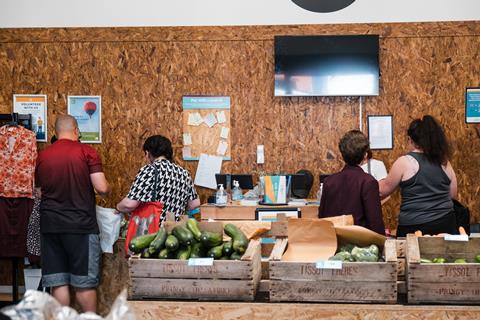Social action projects run by UK churches save the NHS around £8.4bn annually. But that’s not all they’re doing, says Sam Hawthorne

A recent report from National Churches Trust celebrated the fact that UK churches save the NHS approximately £8.4 billion annually. The news couldn’t have come at a more important time. As the leader of the Community Grocery network under The Message Trust, I witness first-hand how churches across the country are stepping up to meet community needs in ways that go far beyond spiritual support.
This staggering figure underlines something we see daily: when the Church gets involved in people’s lives, the benefits ripple out far and wide, even to our health services.
These findings should serve as a wake-up call to policymakers and funders
During the first Covid-19 lockdown in 2020 we delivered 60,000 meals and food parcels to homes and families across Wythenshawe, Manchester who would have struggled to put food on the table without a bit of extra help. And it wasn’t just us - across the UK, churches and Christian organisations led the way in responding to the need in their local communities.
But as that lockdown lifted, the need didn’t go away - in fact, it got worse. We couldn’t stand by and do nothing, so, the idea of a Community Grocery was born. What we didn’t anticipate was the scale of need that would emerge, pushing us to extend our services far beyond that initial plan.
An ever-growing need
Fast forward to today, and Community Grocery has welcomed more than 65,000 member families across 20 locations, offering not only affordable food but also essential wraparound care such as debt management courses, mental health support and job clubs. These services make us part of the solution to some of the greatest challenges the NHS faces.
The National Churches Trust report points out that churches are vital in addressing issues such as addiction recovery, mental health, and youth support. We see this too, every day. The numbers are shocking: 300,000 more children have slipped into absolute poverty, and it’s likely that one in ten parents will need to use food banks to keep their household fed.
These families are facing the brunt of the cost-of-living crisis, which impacts not only their wallets but their health and wellbeing too. The ripple effect of hunger, cold and hopelessness is clear: it manifests in stress, anxiety, depression and even physical illnesses. This creates a perfect storm that heaps pressure onto an already strained NHS.
Being the solution
But churches – and initiatives such as Community Grocery – are part of the solution. We’re not just offering food; we’re offering community and hope. And that’s a key difference. The same report emphasised how churches provide a non-judgmental space for vulnerable individuals to seek help.
We see a similar dynamic at play in our groceries. Each location might look different on the outside – whether it’s a former bingo hall or a community centre – but inside, they’re united by one vision: to provide a dignified, shame-free shopping experience. And, crucially, to offer help with the challenges people face, whether that’s through a cooking-on-a-budget class or a CAP (Christians Against Poverty) debt course.
We’re not just offering food; we’re offering community and hope
Our groceries are located in some of the most deprived areas in the UK. Take Harpurhey, for instance, one of Britain’s most deprived wards, where we opened a new Community Grocery last week. In the first two weeks, 500 families came through our doors. Each one represents a person or family that might otherwise turn to the NHS for support with health issues that stem from poverty.
By offering practical support early on – through access to affordable food and crucial courses – we’re helping to relieve that pressure before it turns into a medical crisis. The National Churches Trust’s findings should serve as a wake-up call to policymakers and funders: churches are part of the answer to the UK’s most pressing social challenges, including the pressures on the NHS. But this work cannot continue without support.
More than food
The work of Community Grocery and other church-based initiatives isn’t just about filling bellies – it’s about filling hearts, minds and communities with hope. It’s about stepping into the gaps that others can’t and offering something uniquely powerful: a combination of practical support and spiritual care.
As we continue to grow, we need the prayers, encouragement and support of everyone who believes that there’s a better way to tackle poverty, hunger and hopelessness. Together, we can continue saving not just pounds from the NHS’s budget but saving lives – physically, mentally, and spiritually.
Find out more about The Message Community Grocery


































No comments yet